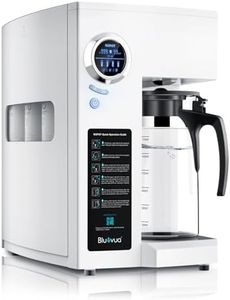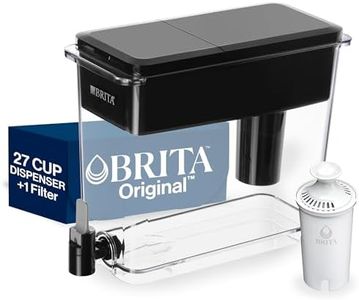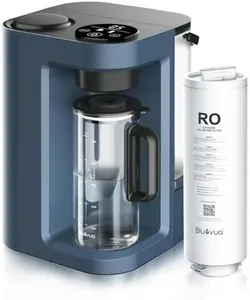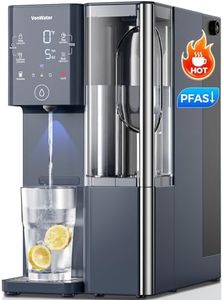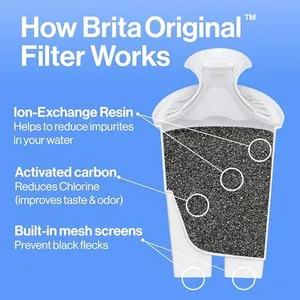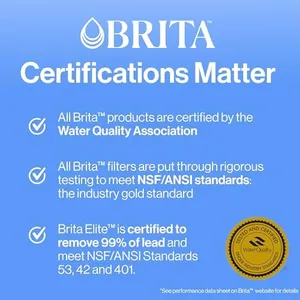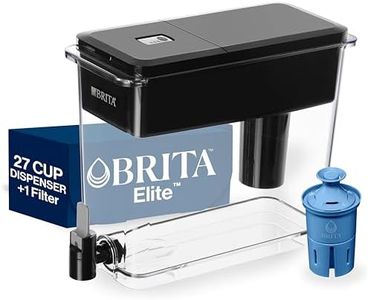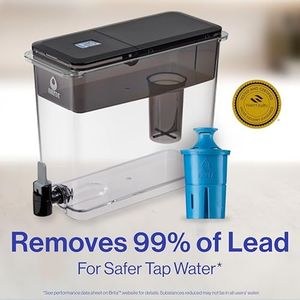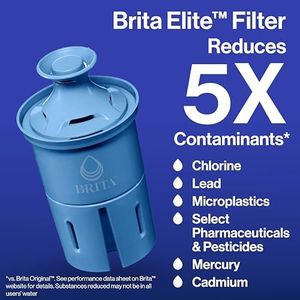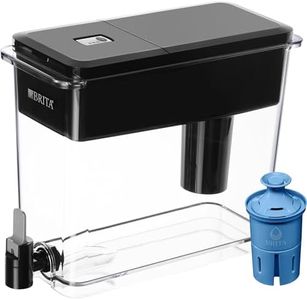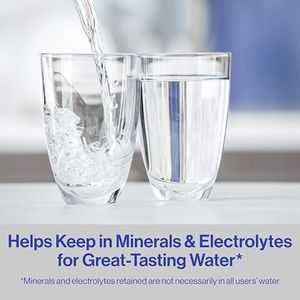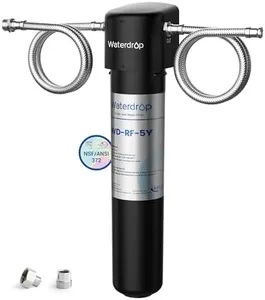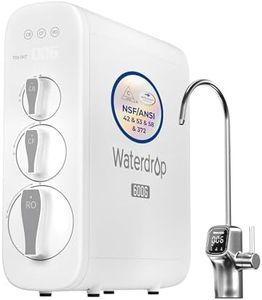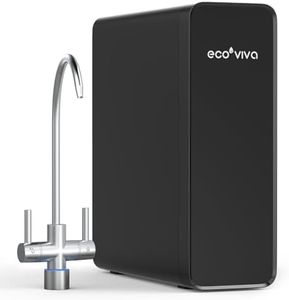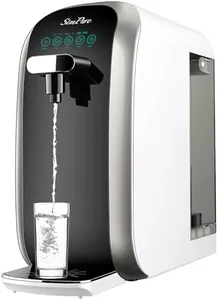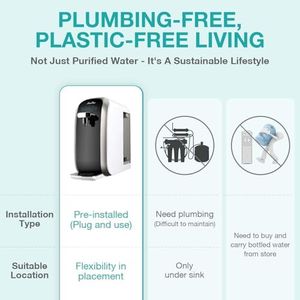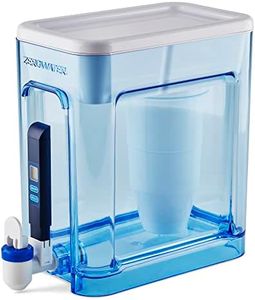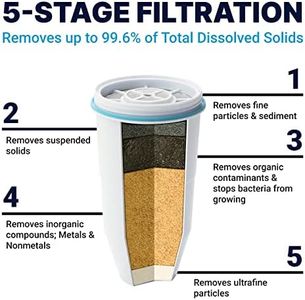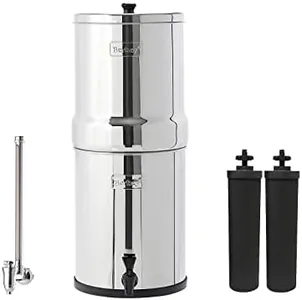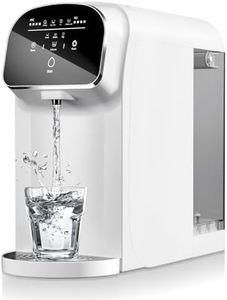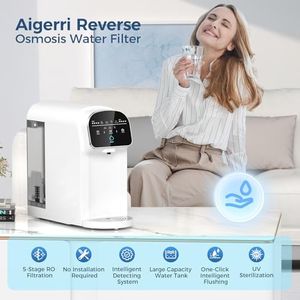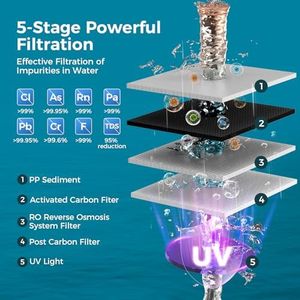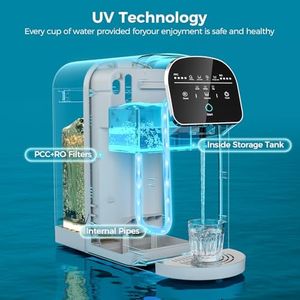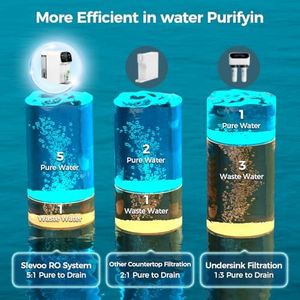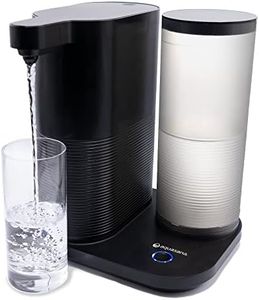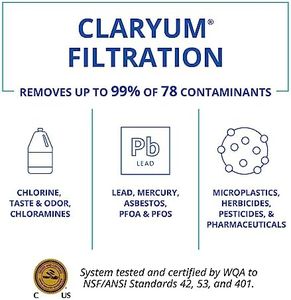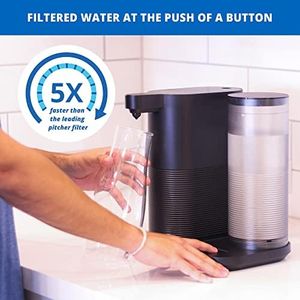10 Best Countertop Water Filters 2025 in the United States
Winner
Bluevua RO100ROPOT-UV Reverse Osmosis System Countertop Water Filter - 6 Stage Purification with UV and Remineralization, Counter RO Filtration, Portable Water Purifier
The Bluevua RO100ROPOT-UV Reverse Osmosis System is an impressive countertop water filter designed for those seeking clean and safe drinking water. Its standout feature is the advanced 6-stage filtration system, which includes a UV light and a remineralization filter. This means it not only reduces harmful contaminants like lead and chlorine but also adds essential minerals back into the water, enhancing both taste and health benefits. The filter is certified for lead-free performance.
Most important from
3971 reviews
Brita UltraMax Large Water Dispenser With Standard Filter, BPA-Free, Reduces Copper, Cadmium and Mercury Impurities, Lasts 2 Months or 40 Gallons, Includes 1 Filter, Kitchen Accessories, Large 27-Cup
The Brita XL Water Filter Dispenser is a practical choice for anyone looking to improve their tap water quality without the hassle of complicated installations. With a large 27-cup capacity, this dispenser is ideal for families or individuals who want to have a steady supply of filtered water on hand. Its filtration technology effectively reduces odors and tastes from chlorine, along with contaminants like copper and mercury, enhancing the drinking experience.
Most important from
12427 reviews
Bluevua RO100ROPOT-LITE Countertop Reverse Osmosis Water Filter System, 5 Stage Purification, 3:1 Pure to Drain, Portable Water Purifier (No Installation Required) (Blue)
The Bluevua RO100ROPOT-LITE is a convenient countertop water filter system that stands out for its no-installation-required design, making it ideal for those who want clean water without the hassle of plumbing. With a compact size and modern aesthetics, it fits well in small kitchens or apartments, making it suitable for individuals or small households.
Most important from
2403 reviews
Top 10 Best Countertop Water Filters 2025 in the United States
Winner
10.0 score
Bluevua RO100ROPOT-UV Reverse Osmosis System Countertop Water Filter - 6 Stage Purification with UV and Remineralization, Counter RO Filtration, Portable Water Purifier
Bluevua RO100ROPOT-UV Reverse Osmosis System Countertop Water Filter - 6 Stage Purification with UV and Remineralization, Counter RO Filtration, Portable Water Purifier
Chosen by 1214 this week
Brita UltraMax Large Water Dispenser With Standard Filter, BPA-Free, Reduces Copper, Cadmium and Mercury Impurities, Lasts 2 Months or 40 Gallons, Includes 1 Filter, Kitchen Accessories, Large 27-Cup
Brita UltraMax Large Water Dispenser With Standard Filter, BPA-Free, Reduces Copper, Cadmium and Mercury Impurities, Lasts 2 Months or 40 Gallons, Includes 1 Filter, Kitchen Accessories, Large 27-Cup
Bluevua RO100ROPOT-LITE Countertop Reverse Osmosis Water Filter System, 5 Stage Purification, 3:1 Pure to Drain, Portable Water Purifier (No Installation Required) (Blue)
Bluevua RO100ROPOT-LITE Countertop Reverse Osmosis Water Filter System, 5 Stage Purification, 3:1 Pure to Drain, Portable Water Purifier (No Installation Required) (Blue)
APEC Water Systems ROES-PH75 Essence Series Top Tier Alkaline Mineral pH+ 75 GPD 6-Stage Certified Ultra Safe Reverse Osmosis Drinking Water Filter System
APEC Water Systems ROES-PH75 Essence Series Top Tier Alkaline Mineral pH+ 75 GPD 6-Stage Certified Ultra Safe Reverse Osmosis Drinking Water Filter System
Brita UltraMax Elite Water Filter Dispenser, Removes 99% of Lead, Includes 1 Filter, 27-Cup, Black
Brita UltraMax Elite Water Filter Dispenser, Removes 99% of Lead, Includes 1 Filter, 27-Cup, Black
SimPure Y7P-BW UV Countertop Reverse Osmosis Water Filter, NSF/ANSI 58 Certified, 5 Stage RO Water Filtration System, Water Purifier for Home, 4: 1 Pure to Drain, BPA Free (No Installation Required)
SimPure Y7P-BW UV Countertop Reverse Osmosis Water Filter, NSF/ANSI 58 Certified, 5 Stage RO Water Filtration System, Water Purifier for Home, 4: 1 Pure to Drain, BPA Free (No Installation Required)
Royal Berkey Gravity-Fed Water Filter System with 2 Black Berkey Elements Plus Deluxe 10" Stainless Steel Berkey Water View Spigot
Royal Berkey Gravity-Fed Water Filter System with 2 Black Berkey Elements Plus Deluxe 10" Stainless Steel Berkey Water View Spigot
Countertop Reverse Osmosis System Water Filter with UV, 5:1 Pure to Drain, 5 Stage RO Water Filtration, Portable No Installation Water Filtration Systems, Countertop Filtration for Home, Off White
Countertop Reverse Osmosis System Water Filter with UV, 5:1 Pure to Drain, 5 Stage RO Water Filtration, Portable No Installation Water Filtration Systems, Countertop Filtration for Home, Off White
8.0 score
Aquasana Countertop Water Filter System for Drinking Water - Clean Water Machine - Removes 97% of Chlorine from Tap Water - Compact Water Filtration for Kitchen - Filtered Water Dispenser
Aquasana Countertop Water Filter System for Drinking Water - Clean Water Machine - Removes 97% of Chlorine from Tap Water - Compact Water Filtration for Kitchen - Filtered Water Dispenser
Our technology thoroughly searches through the online shopping world, reviewing hundreds of sites. We then process and analyze this information, updating in real-time to bring you the latest top-rated products. This way, you always get the best and most current options available.

